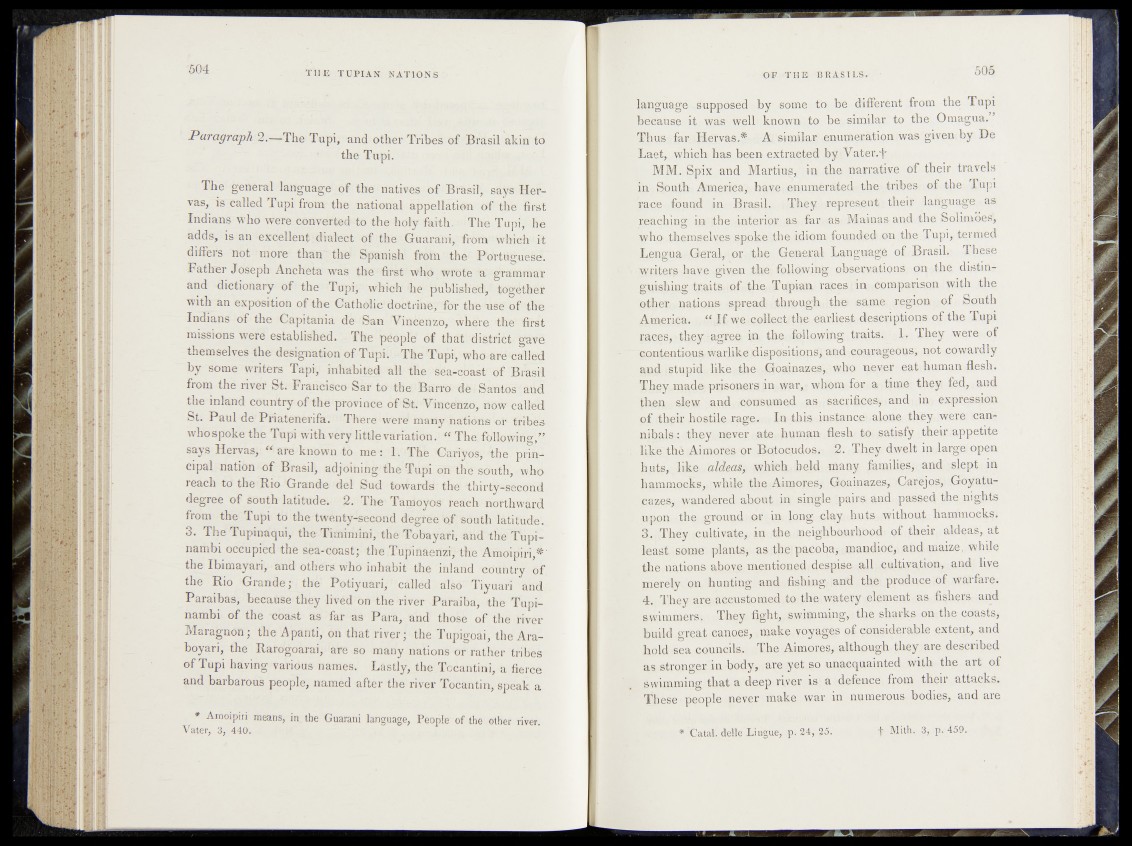
Paragraph 2.—'The Tapi, and other Tribes of Brasil akin to
the Tapi.
The general language the natives of Brasil-j says Her-
vas,:ngTealled Tapi frbm the national appellation of the. first
Indians who were converted to the holy faith. The Tupi, he
adds^ is an excellent; dialect of the *Guarani,from which'It
differs not more- than the* Spanish from the- Pchtl^^êtó’
-Father Joseph Anchefca was fhë-'firèt*wbp wröte "a^gralnmar
and dietionary of the Tupi, which' h e published/ together
with an exposition of the Catholic doctrine,'- for the hse of the
Indians of the Capitania de San Vincenzo, where the first
missions werd established. The people8 of that district
themselves the designation of Tupi. The Tupi,Jwho ads'fealfed
by some writers Tapi, inhabited all the^Sea-ebastiof B fS l
from thé river St. Franéiseo Sar to thé Barro dë>Sahtös 'and
the inland country of the province of St. VincdSzO, now calléti
St. Paul dé'Priatenerifa. There werd many nationS or tribes-
whospokethé Tupi with very little variation. “ Thétfbllowrhgi”
says Hervas, ^ k n o w n tO me: 1. Thé Cariyüsy4he‘principal
nation of Brasil, adjoining the Tupi on thé1 south, «who
reach to the Rio Grande del Sud towards the11hirty-sécönd
degree of south latitude. 2. The Tamoyos reach Northward
from the Tupi to the twénty-secönd degree of south latitude.
3, The Tupinaqui, the Timimini, the Tobayari, and the Tupi-
nambi occupied the sea-coast; the Tupinaenzi, the Amoiprri,*
the Ibimayari, and others who inhabit the inland coüntry Of.
the Rio Grande; the Potiyoari, ‘ called also Tiyuari and
Paraibas, because they livéd on the river Paraiba, the Tupi-
nambi of the "coast as far as Para, and those of the river
Maragnon; the Apanti, on that river * the Tupigoai, the Ara-
boyari, the Rardgoarai; are so many nations or rather tribes
of Tupi having various names. Lastly, the Toeantini, a fierce
and barbarous people, named after the river Tocantin, speak a
* Amoipiri means, in, the Guarani language, People of the other river.
Vater, 3, 440.
language^supposed'by -some • €o be different from the Tupi
fth&usp, it »wa? (.well1 known .to, be^sknilar to the,.Omagua. ’
Thus.,-far BerVas.^'' Apsiipplar; .ftnupapration .was given; by De
Last, which has. been extracted’ ajter.-f; -
MM. Spix and Martius, in..the. narrative * of their travels
in , ^outh America,, have-enumerafed^tfie'-tribes ©>?‘the Tupi
rape found i,n Brazil. dThey ;,rep^^pjt their languages-as
reaching in jthe interior tas far, ,aSf,Matna-s and the Solimbes^
who , tharnsalyes^ .spoke, ,th e> idi om founded! on the Tupi,, ter died
Lengua,' Geral,*pr, the Genera-l Lajnggs^e ©f,Brasil. These
i writer? have «given th%f®llowin|J observation? distint
giiis|iig traits,fpf thejtTgpian? r^sTii^prfiparison with 4hg
'pflher,. natiotJh S^readn jtLrpngh, the» same region g of South
America, wfe,cp}kpt/the, earliesJndescri.ptions; of the Tupi
races, * theyfagrees in the fpllowfig traits!*/ m They .were«.of
~e,ontentioyUS.wa r 1ike rii^^itjpnS| afid, courageQysv not cowardly
and .stupid: like - the |Goaiinaze?K who never eat, human flesh.
Thpy..mad©; prisoners in war,- wheiji for a • time they fed, and
then. slew and iCOitsumed .ps, «sacrifices;, |and > in ; expression
pfjthgdr hosrilp^agf^f:.? In this insfancj^algne, thfcy.iwers''Scan?*
mhals: they,, njever. ate.human % flesh., to-,.satisfy their appetite
like the Aimor.es or Batocsudosn 2. They dwelt in Jarg&open
aldeas, which, held many fami^s,\>apd4^gpt in
haprtndcks, wh% tfie AimopiSy Goainazes, >Ga^ja^,! .Goyatu-
cazes, wandered about in single 'pairs dad, passed the nights
tbej ground or« ip, long
d. They cultivate, in the ineighbourhoodi of .their aldeas, at
feast, -some plantsthe]p.9ceb®»rToandfec,: and maize, while
the nations above: mentioned, cfe?pise all cultivation, and live,
merely, on hunting and .fishing/:and the« produce^of warfare.
4. They are accustomed,to the,watery .element as fishers and
swimmers. They fight,.swimming»?the sharks op/the coasts,
build great canoes, make voyages of considerable extent, and
hold sea councils. The Aimores, although they^are described
as stronger in body, are yet jo unacquainted, with the art of
swimming that a deep river is- a defence, from their attacks..
These • people never make war in numerous bodies, and are